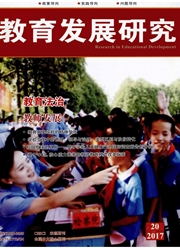

 中文摘要:
中文摘要:
本研究基于中国劳动力市场多重分割的视角,使用CHNS-2009的数据,分析了在考虑实物期权价值后个体教育投资的收益。实证结果发现,三种劳动力市场分割对教育投资的风险价值影响排序为城乡〈性别〈地区,三种劳动力市场分割对初中一大学的实物期权价值影响排序为城乡〉性别〉地区,这两者的排序正好反向。研究认为,这种看似矛盾的现象其实是对中国劳动力市场多重分割的最好诠释。因此,提高弱势群体的教育机会,不仅是有助于提高教育公平.也是符合效率原则的.
 英文摘要:
英文摘要:
Using data from CHNS-2009, this study analyzed private return of education in the segmentation of the Chinese labor market using theory of real option. Empirical results show that, compared with gender and districts, the urbanrural factor values has the least influence in the option value of educational investment but values most in the total value of educational investment. These seemingly contradictory results are consistent with the multiple segmentations of the Chinese labor market. This study suggests that supplying more educational opportunities for vulnerable groups should improve both education equity and education efficiency.
 同期刊论文项目
同期刊论文项目
 同项目期刊论文
同项目期刊论文
 期刊信息
期刊信息
